Unit 2 Language——reading(共44张PPT)
文档属性
| 名称 | Unit 2 Language——reading(共44张PPT) |
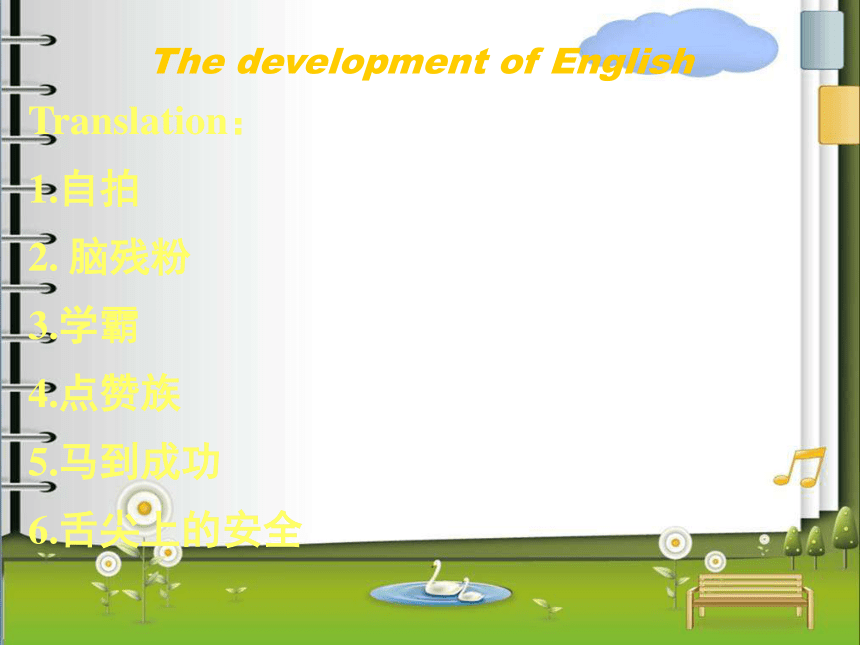
|
|
| 格式 | zip | ||
| 文件大小 | 980.4KB | ||
| 资源类型 | 教案 | ||
| 版本资源 | 牛津译林版 | ||
| 科目 | 英语 | ||
| 更新时间 | 2016-11-05 00:00:00 | ||
图片预览

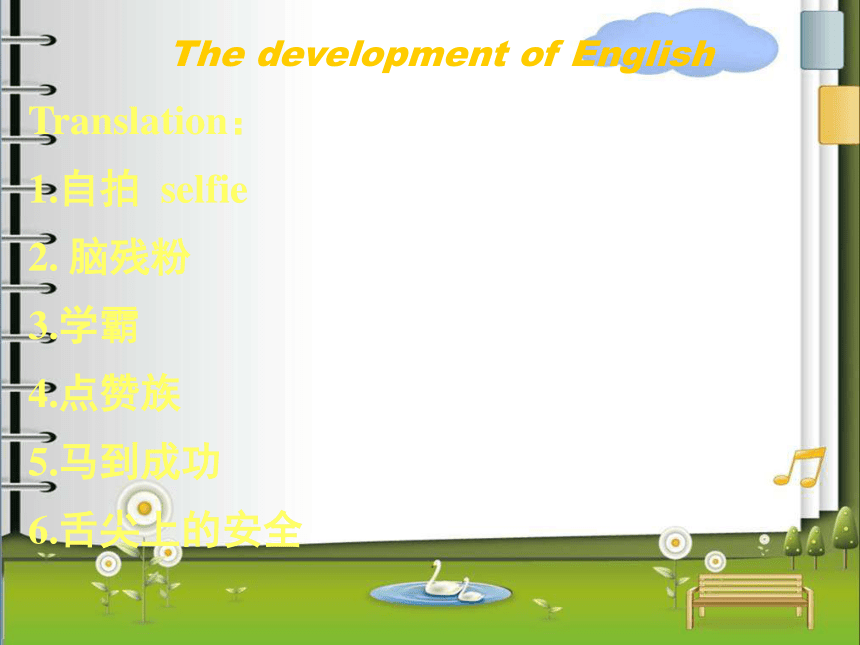
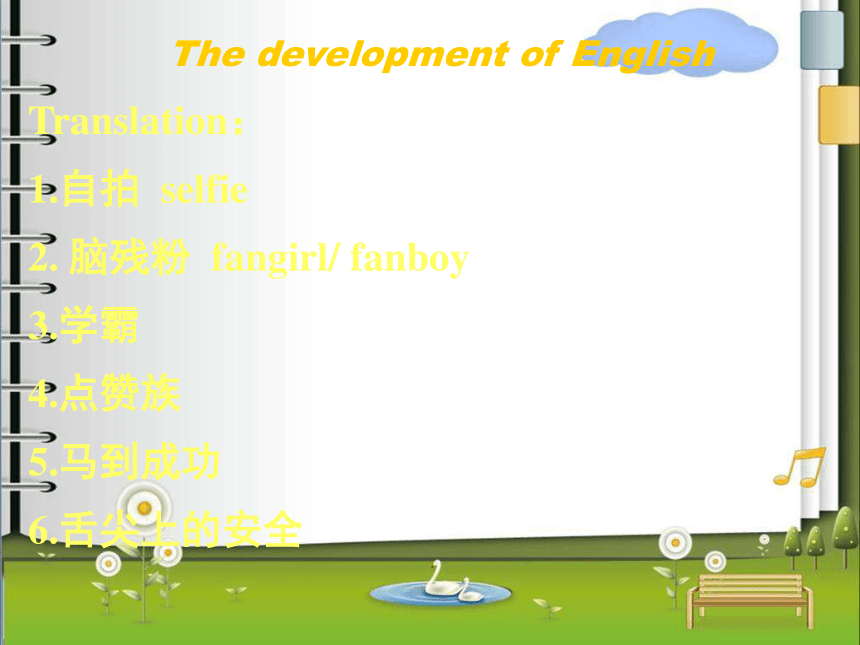
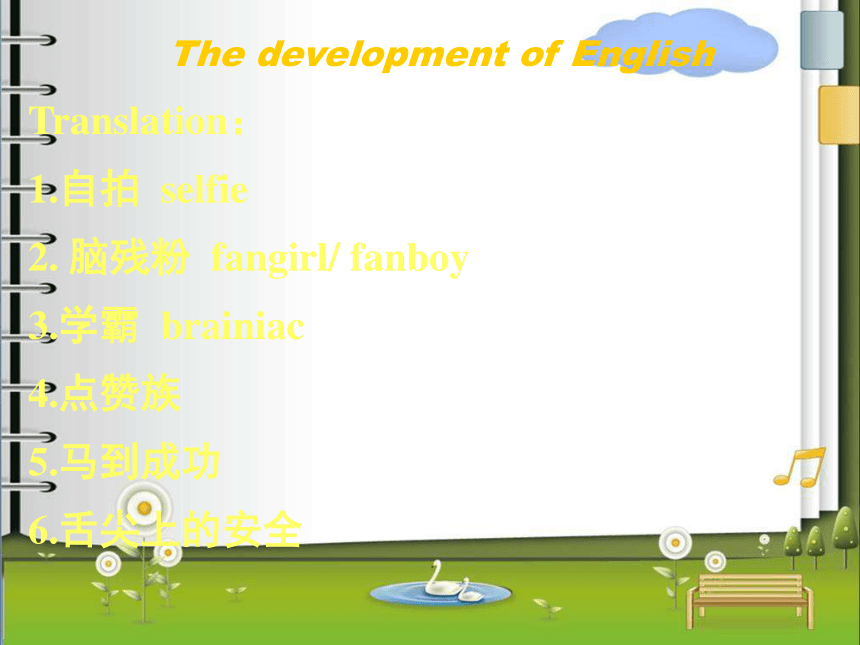
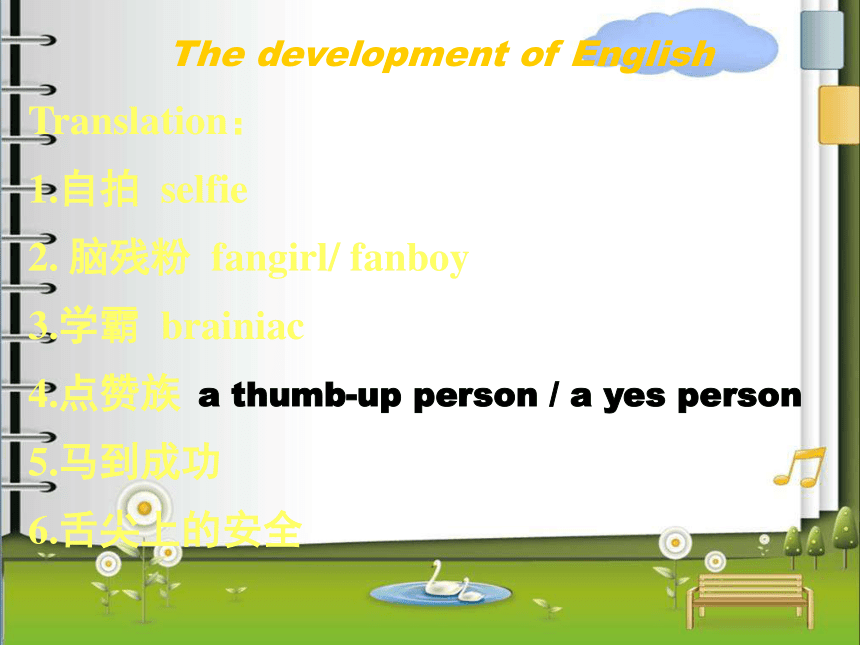
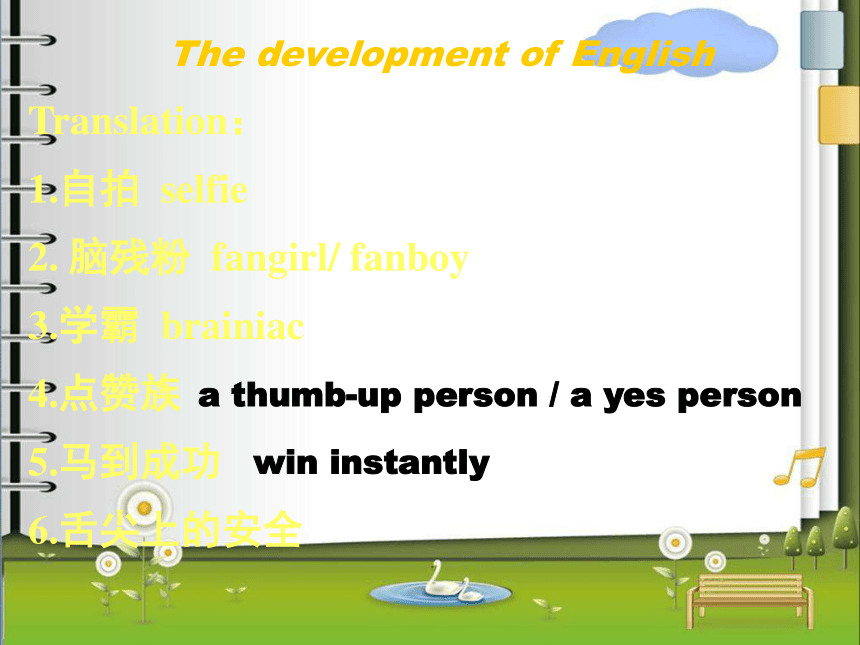
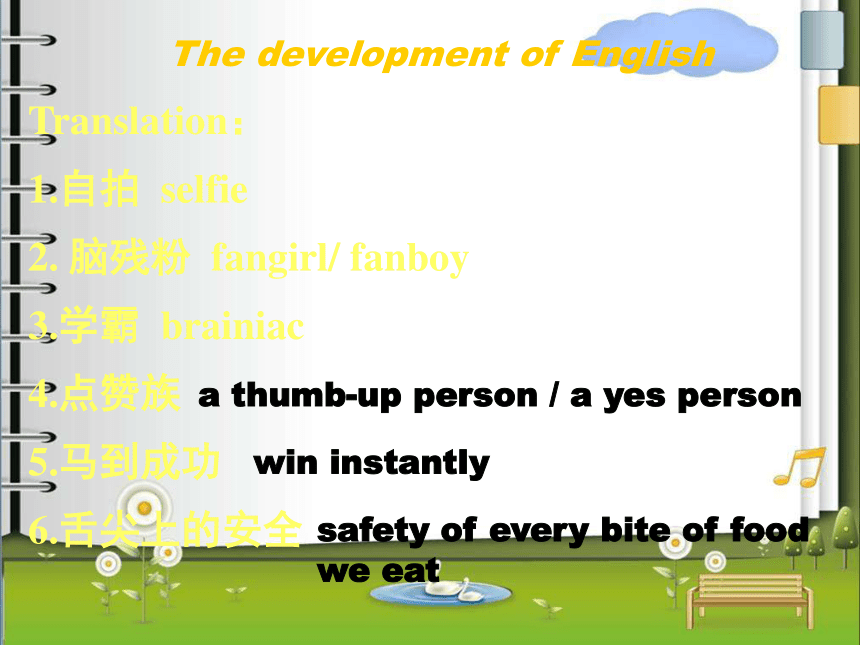

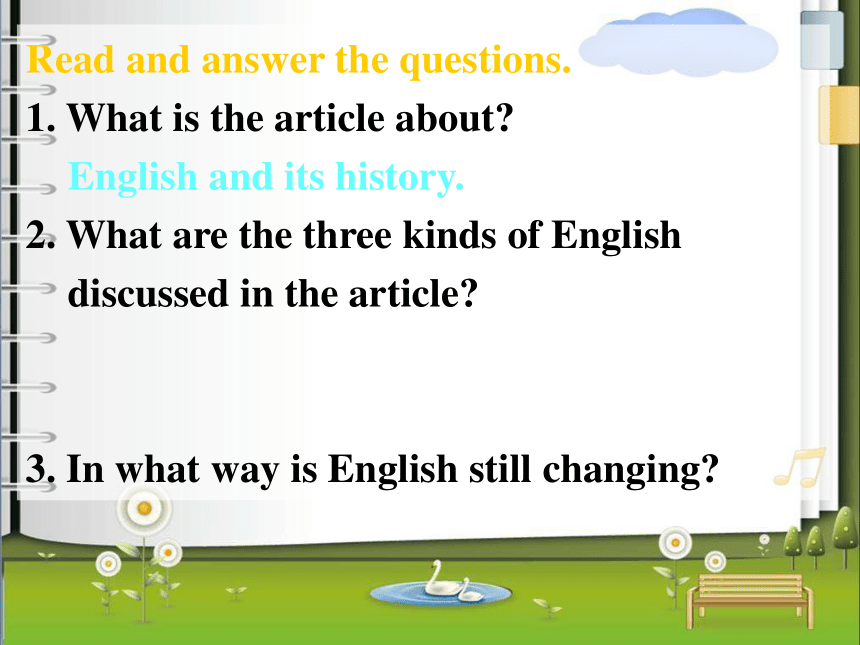
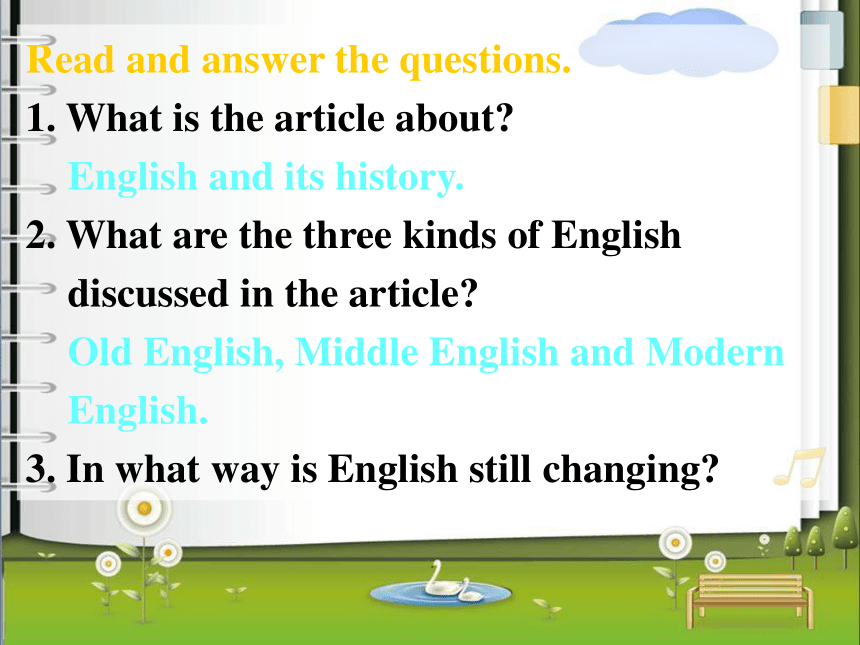
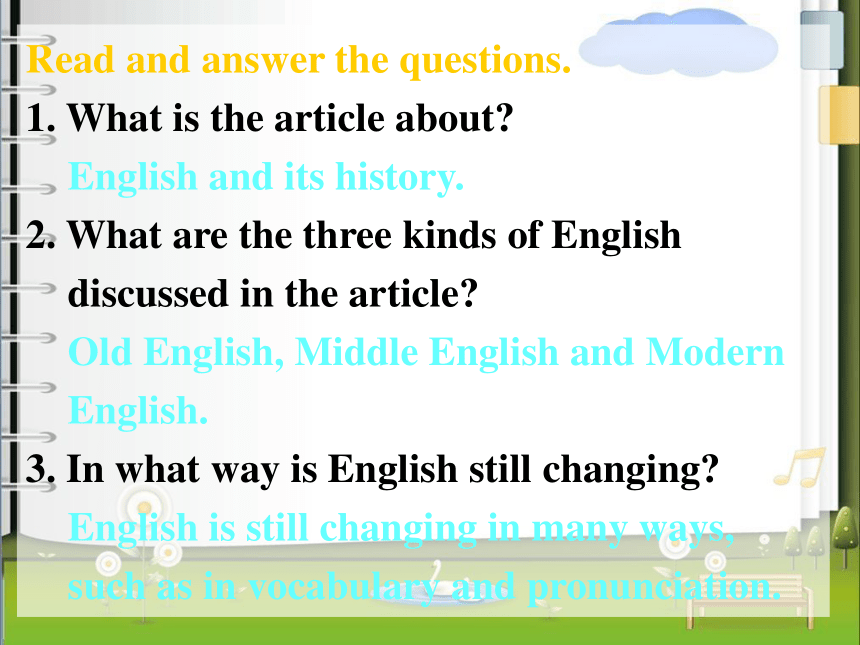
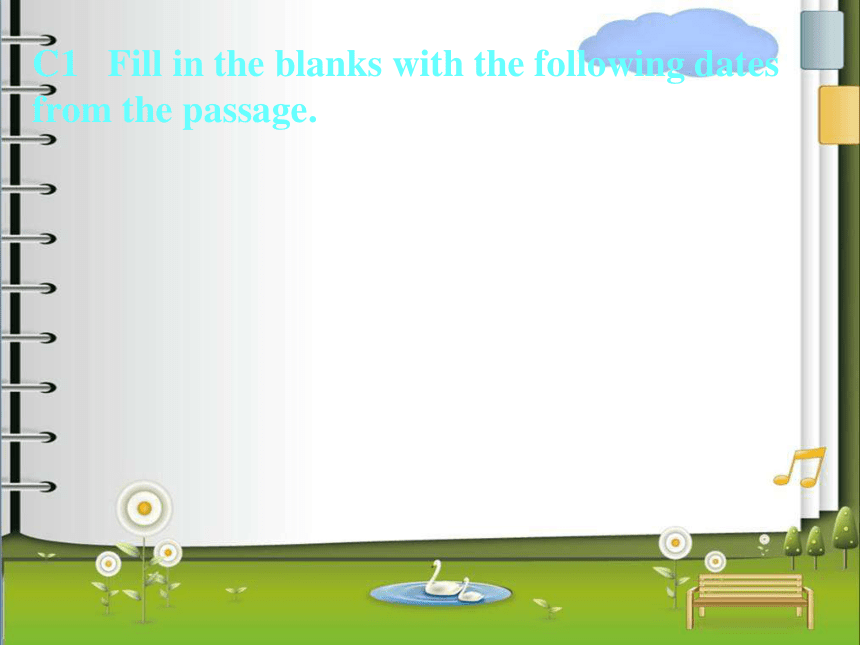
文档简介
课件44张PPT。The development of EnglishTranslation:
1.自拍
2. 脑残粉
3.学霸
4.点赞族
5.马到成功
6.舌尖上的安全The development of EnglishTranslation:
1.自拍 selfie
2. 脑残粉
3.学霸
4.点赞族
5.马到成功
6.舌尖上的安全The development of EnglishTranslation:
1.自拍 selfie
2. 脑残粉 fangirl/ fanboy
3.学霸
4.点赞族
5.马到成功
6.舌尖上的安全The development of EnglishTranslation:
1.自拍 selfie
2. 脑残粉 fangirl/ fanboy
3.学霸 brainiac
4.点赞族
5.马到成功
6.舌尖上的安全 a thumb-up person / a yes personThe development of EnglishTranslation:
1.自拍 selfie
2. 脑残粉 fangirl/ fanboy
3.学霸 brainiac
4.点赞族
5.马到成功
6.舌尖上的安全 a thumb-up person / a yes person win instantly The development of EnglishTranslation:
1.自拍 selfie
2. 脑残粉 fangirl/ fanboy
3.学霸 brainiac
4.点赞族
5.马到成功
6.舌尖上的安全 a thumb-up person / a yes person win instantly safety of every bite of food we eatThe development of EnglishTranslation:
1.自拍 selfie
2. 脑残粉 fangirl/ fanboy
3.学霸 brainiac
4.点赞族
5.马到成功
6.舌尖上的安全Read and answer the questions.
1. What is the article about?
2. What are the three kinds of English discussed in the article?
3. In what way is English still changing?Read and answer the questions.
1. What is the article about? English and its history.
2. What are the three kinds of English discussed in the article?
3. In what way is English still changing?Read and answer the questions.
1. What is the article about? English and its history.
2. What are the three kinds of English discussed in the article? Old English, Middle English and Modern English.
3. In what way is English still changing?Read and answer the questions.
1. What is the article about? English and its history.
2. What are the three kinds of English discussed in the article? Old English, Middle English and Modern English.
3. In what way is English still changing? English is still changing in many ways, such as in vocabulary and pronunciation.C1 Fill in the blanks with the following dates from the passage.Fill in the blanks with the following dates from the passage.5th century 9th century 10th century 1066
14th century 16th centuryFill in the blanks with the following dates from the passage.1. Before the middle of the __________, people in Britain did not speak English.
2. Modern English began to develop in the ___________.
3. Almost everyone in England began to speak Middle English in the ____________.5th century 9th century 10th century 1066
14th century 16th centuryFill in the blanks with the following dates from the passage.1. Before the middle of the __________, people in Britain did not speak English.
2. Modern English began to develop in the ___________.
3. Almost everyone in England began to speak Middle English in the ____________.5th century5th century 9th century 10th century 1066
14th century 16th centuryFill in the blanks with the following dates from the passage.1. Before the middle of the __________, people in Britain did not speak English.
2. Modern English began to develop in the ___________.
3. Almost everyone in England began to speak Middle English in the ____________.5th century5th century 9th century 10th century 1066
14th century 16th century16th centuryFill in the blanks with the following dates from the passage.1. Before the middle of the __________, people in Britain did not speak English.
2. Modern English began to develop in the ___________.
3. Almost everyone in England began to speak Middle English in the ____________.5th century5th century 9th century 10th century 1066
14th century 16th century16th century14th century4. At the end of the __________,
Norwegian words began to be used in the English language.
5. The Normans occupied England in ___________
6. By the ____________, people in England used Old English as the official language. 4. At the end of the __________,
Norwegian words began to be used in the English language.
5. The Normans occupied England in ___________
6. By the ____________, people in England used Old English as the official language. 9th century4. At the end of the __________,
Norwegian words began to be used in the English language.
5. The Normans occupied England in ___________
6. By the ____________, people in England used Old English as the official language. 9th century10664. At the end of the __________,
Norwegian words began to be used in the English language.
5. The Normans occupied England in ___________
6. By the ____________, people in England used Old English as the official language. 9th century106610th centuryRead the three parts again, and fill in the chart.Part 1 Old EnglishPeople in Britain all spoke a language called Celtic.People in Britain all spoke a language called Celtic.The Vikings began to move to Britain and brought their languages.People in Britain all spoke a language called Celtic.The Vikings began to move to Britain and brought their languages.Old English was the official language of England.Part 2 Middle EnglishBy the latter half
of the 14th century In 1399TimeEventsBy the latter half
of the 14th century In 1399TimeEventsThe Normans defeated
England and took control
of the country.By the latter half
of the 14th century In 1399English had come into widespread use among all classes in England.TimeEventsThe Normans defeated
England and took control
of the country.By the latter half
of the 14th century In 1399English had come into widespread use among all classes in England.Henry IV became King of England and used English for all official events.TimeEventsThe Normans defeated
England and took control
of the country.Part 3 Modern EnglishTimeEventsModern English
appeared.TimeEventsRead and answer the questions.1.Why does the English language have so many rules that confuse people?Read and answer the questions.1.Why does the English language have so many rules that confuse people?
Because it is made up of the grammar and vocabulary that people from different countries and cultures brought with them to Britain. 2. Where did the English come from?
3. Why can words with similar meanings be found in the English language?2. Where did the English come from?
It came from the word Engle, as it
is spelt in old English.
3. Why can words with similar meanings be found in the English language?2. Where did the English come from?
It came from the word Engle, as it
is spelt in old English.
3. Why can words with similar meanings be found in the English language?
These words with similar meanings developed because each word came from a different language.4. Who made the greatest contribution to the development from Old English to Middle English?
5. Why are many of the words for animals different from those for meat in English?4. Who made the greatest contribution to the development from Old English to Middle English?
The French-speaking Normans, who took control of England in 1066.
5. Why are many of the words for animals different from those for meat in English?4. Who made the greatest contribution to the development from Old English to Middle English?
The French-speaking Normans, who took control of England in 1066.
5. Why are many of the words for animals different from those for meat in English?
The words for animals came from old English, While the words for the meat came from Old French.Homework1. 课课练:pages 38-40;
2. Remember the new words in "Reading".
1.自拍
2. 脑残粉
3.学霸
4.点赞族
5.马到成功
6.舌尖上的安全The development of EnglishTranslation:
1.自拍 selfie
2. 脑残粉
3.学霸
4.点赞族
5.马到成功
6.舌尖上的安全The development of EnglishTranslation:
1.自拍 selfie
2. 脑残粉 fangirl/ fanboy
3.学霸
4.点赞族
5.马到成功
6.舌尖上的安全The development of EnglishTranslation:
1.自拍 selfie
2. 脑残粉 fangirl/ fanboy
3.学霸 brainiac
4.点赞族
5.马到成功
6.舌尖上的安全 a thumb-up person / a yes personThe development of EnglishTranslation:
1.自拍 selfie
2. 脑残粉 fangirl/ fanboy
3.学霸 brainiac
4.点赞族
5.马到成功
6.舌尖上的安全 a thumb-up person / a yes person win instantly The development of EnglishTranslation:
1.自拍 selfie
2. 脑残粉 fangirl/ fanboy
3.学霸 brainiac
4.点赞族
5.马到成功
6.舌尖上的安全 a thumb-up person / a yes person win instantly safety of every bite of food we eatThe development of EnglishTranslation:
1.自拍 selfie
2. 脑残粉 fangirl/ fanboy
3.学霸 brainiac
4.点赞族
5.马到成功
6.舌尖上的安全Read and answer the questions.
1. What is the article about?
2. What are the three kinds of English discussed in the article?
3. In what way is English still changing?Read and answer the questions.
1. What is the article about? English and its history.
2. What are the three kinds of English discussed in the article?
3. In what way is English still changing?Read and answer the questions.
1. What is the article about? English and its history.
2. What are the three kinds of English discussed in the article? Old English, Middle English and Modern English.
3. In what way is English still changing?Read and answer the questions.
1. What is the article about? English and its history.
2. What are the three kinds of English discussed in the article? Old English, Middle English and Modern English.
3. In what way is English still changing? English is still changing in many ways, such as in vocabulary and pronunciation.C1 Fill in the blanks with the following dates from the passage.Fill in the blanks with the following dates from the passage.5th century 9th century 10th century 1066
14th century 16th centuryFill in the blanks with the following dates from the passage.1. Before the middle of the __________, people in Britain did not speak English.
2. Modern English began to develop in the ___________.
3. Almost everyone in England began to speak Middle English in the ____________.5th century 9th century 10th century 1066
14th century 16th centuryFill in the blanks with the following dates from the passage.1. Before the middle of the __________, people in Britain did not speak English.
2. Modern English began to develop in the ___________.
3. Almost everyone in England began to speak Middle English in the ____________.5th century5th century 9th century 10th century 1066
14th century 16th centuryFill in the blanks with the following dates from the passage.1. Before the middle of the __________, people in Britain did not speak English.
2. Modern English began to develop in the ___________.
3. Almost everyone in England began to speak Middle English in the ____________.5th century5th century 9th century 10th century 1066
14th century 16th century16th centuryFill in the blanks with the following dates from the passage.1. Before the middle of the __________, people in Britain did not speak English.
2. Modern English began to develop in the ___________.
3. Almost everyone in England began to speak Middle English in the ____________.5th century5th century 9th century 10th century 1066
14th century 16th century16th century14th century4. At the end of the __________,
Norwegian words began to be used in the English language.
5. The Normans occupied England in ___________
6. By the ____________, people in England used Old English as the official language. 4. At the end of the __________,
Norwegian words began to be used in the English language.
5. The Normans occupied England in ___________
6. By the ____________, people in England used Old English as the official language. 9th century4. At the end of the __________,
Norwegian words began to be used in the English language.
5. The Normans occupied England in ___________
6. By the ____________, people in England used Old English as the official language. 9th century10664. At the end of the __________,
Norwegian words began to be used in the English language.
5. The Normans occupied England in ___________
6. By the ____________, people in England used Old English as the official language. 9th century106610th centuryRead the three parts again, and fill in the chart.Part 1 Old EnglishPeople in Britain all spoke a language called Celtic.People in Britain all spoke a language called Celtic.The Vikings began to move to Britain and brought their languages.People in Britain all spoke a language called Celtic.The Vikings began to move to Britain and brought their languages.Old English was the official language of England.Part 2 Middle EnglishBy the latter half
of the 14th century In 1399TimeEventsBy the latter half
of the 14th century In 1399TimeEventsThe Normans defeated
England and took control
of the country.By the latter half
of the 14th century In 1399English had come into widespread use among all classes in England.TimeEventsThe Normans defeated
England and took control
of the country.By the latter half
of the 14th century In 1399English had come into widespread use among all classes in England.Henry IV became King of England and used English for all official events.TimeEventsThe Normans defeated
England and took control
of the country.Part 3 Modern EnglishTimeEventsModern English
appeared.TimeEventsRead and answer the questions.1.Why does the English language have so many rules that confuse people?Read and answer the questions.1.Why does the English language have so many rules that confuse people?
Because it is made up of the grammar and vocabulary that people from different countries and cultures brought with them to Britain. 2. Where did the English come from?
3. Why can words with similar meanings be found in the English language?2. Where did the English come from?
It came from the word Engle, as it
is spelt in old English.
3. Why can words with similar meanings be found in the English language?2. Where did the English come from?
It came from the word Engle, as it
is spelt in old English.
3. Why can words with similar meanings be found in the English language?
These words with similar meanings developed because each word came from a different language.4. Who made the greatest contribution to the development from Old English to Middle English?
5. Why are many of the words for animals different from those for meat in English?4. Who made the greatest contribution to the development from Old English to Middle English?
The French-speaking Normans, who took control of England in 1066.
5. Why are many of the words for animals different from those for meat in English?4. Who made the greatest contribution to the development from Old English to Middle English?
The French-speaking Normans, who took control of England in 1066.
5. Why are many of the words for animals different from those for meat in English?
The words for animals came from old English, While the words for the meat came from Old French.Homework1. 课课练:pages 38-40;
2. Remember the new words in "Reading".
